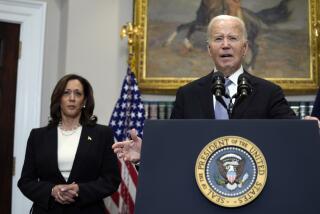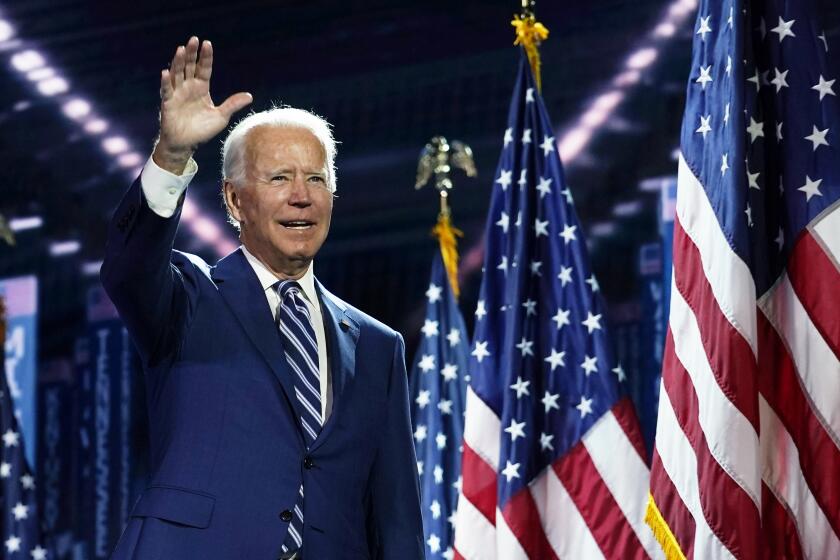Pete Stark May Be a Tough Pill for Clinton to Swallow : Chairman of key House subcommittee irks Administration by pushing his own plan to provide universal health coverage.
To the White House, watching Rep. Pete Stark (D-Hayward) maneuver his health care reform package through the House Ways and Means health subcommittee is a bit like having your eccentric uncle borrow the car. Your palms get sweaty just thinking about it.
The cantankerous 11-term liberal, who has chaired the health panel since 1985, thrives on confrontation, takes direction poorly and has a habit of unleashing outlandish remarks.
Rather than heed President Clinton’s request to wait until the Administration’s health plan had gelled, Stark weighed in with his own plan to provide universal coverage by greatly expanding Medicare, which Stark’s subcommittee oversees.
Stark had also declared “managed competition”--a pillar of the Clinton plan--to be a delusion. “A unicorn, . . . a beautiful animal in fairyland,” he dubbed it, with characteristic vigor.
A White House aide, who for obvious reasons didn’t wish to be identified, this week described the 62-year-old Stark as “erratic and unpredictable.”
“We had to figure out how to work with him,” the aide said. “Basically, it was keeping him away from (Ira) Magaziner,” chief architect of the Administration’s health care opus and a frequent Stark target. “Now we’re making some progress.”
As the first of at least five major House and Senate committees tackled the health care issue, Stark managed to dispel some of the White House Angst by winning close votes on key elements his bill shares with Clinton’s proposal.
Last week, the subcommittee endorsed the most controversial piece of the Administration plan contained in Stark’s bill: the requirement that employers pay 80% of health insurance premiums for their workers. On Monday, the panel fought off a Republican attempt to strip backup price controls on health care costs and backed a cap on malpractice awards for “pain and suffering.”
While the Stark bill eventually may be rendered unrecognizable as it is chewed upon by the full Ways and Means Committee--and other committees begin to unveil their own versions--he will have performed a valuable service by pushing the first health care legislative vehicle off the starting line.
“One thing about him, he usually gets a bill out and is usually successful in getting it through the (full) committee,” said a fellow California lawmaker.
Yet to some members, such legislative prowess is nothing short of astonishing, given Stark’s legendary flammable personality and fondness for verbal assault.
“Pete’s one of the more erratic members in the House,” said the California colleague. “There’s something about him that makes you wonder if it goes deeper than just being hotheaded. When he loses it, it really diminishes his effectiveness.”
In his most recent misstep, Stark last week angered Rep. Nancy L. Johnson (R-Conn.), the only woman on his subcommittee, by telling her that she learned what she knows about health care “through pillow talk” with her gynecologist husband.
Stark later apologized to Johnson, a leading voice on health care who later declined to sign a letter of protest circulated by Republicans over the episode.
In 1990, he called then-Health and Human Services Secretary Louis W. Sullivan, who is black, “as close to being a disgrace to his race as anyone I’ve ever seen” for supporting Bush Administration health policies.
Sullivan demanded an apology, saying, “I don’t live on Pete Stark’s plantation.”
“He’s right,” Stark countered, “ . . . he lives on John Sununu’s,” referring to Bush’s chief of staff.
A formal letter of apology was finally delivered.
Early in his congressional career, Stark, who is white, raised eyebrows when he sought, without success, membership in the Congressional Black Caucus. And in 1991, Stark, a Unitarian, attacked “Jewish colleagues” for voting for the Persian Gulf War resolution “as a matter of convenience” to help Israel.
Since his election to Congress in 1972, Stark has pursued an eclectic liberal agenda. He once rummaged through grocery store dumpsters in his tan poplin suit to dramatize food waste. As chairman of the District of Columbia Committee, Stark doggedly pursues his goal of statehood for the district in the face of palpable apathy over the issue.
He remains one of the most flamboyant members in the House.
“But you must remember,” said an Administration health planner who requested anonymity, “style is not that important. He’s influential in the debate because of where he is, not who he is.”
More to Read
Get the L.A. Times Politics newsletter
Deeply reported insights into legislation, politics and policy from Sacramento, Washington and beyond. In your inbox three times per week.
You may occasionally receive promotional content from the Los Angeles Times.






